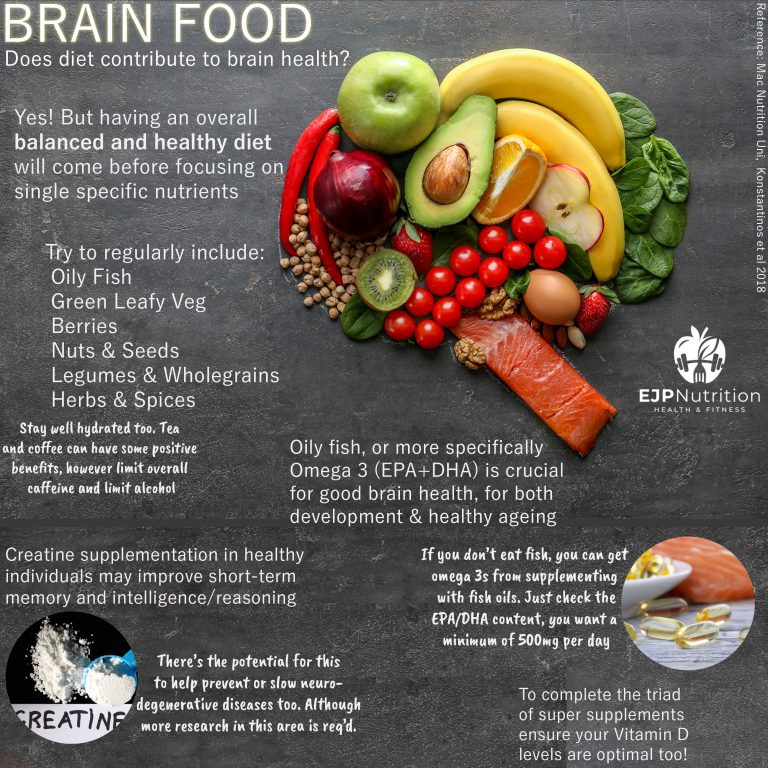From a nutritional viewpoint, can what we eat (or drink) affect the health of our brain? In short, yes! Rather it being one or two key nutrients, it’s the overall pattern of your diet that’s important. Sorry if I’m always repeating myself, but it comes back to having an overall balanced and healthy diet!
Let’s look at what to include. Firstly oily fish, as we need omega 3 (if you don’t eat fish, fish oil supplements are fine). This is incredibly important for brain health and essential that we get them from our diet as we can’t synthesis them ourselves. If you supplement (algae for a vegan option) check the EPA and DHA content, of which we want a minimum of 500mg per day.
As we age, a decreased level of omega 3 is a commonality in people who suffer from Alzheimer’s and Parkinson’s. Oxidative stress and inflammation (which can lead to neurodegeneration) can be modulated by EPA and DHA, so having enough is important. Early supplementation has been shown to have a significant benefit in treating or preventing neurodegenerative diseases.
There is mixed research on whether creatine supplementation may be protective against neurodegenerative diseases. There’s promise from animal studies (which we know may not transfer to humans). One review looking at human clinical studies found it didn’t help treatment, but there’s potential it could help prevent or slow down the progression of degeneration. Considering the other known benefits of creatine, and the safety of it as a supplement, it is worth trying.
So, back to foods that help your brain health which are mostly fruit, vegetables, and grains. More specifically, we want green leafy vegetables for a range of essential nutrients the brain requires, such as folate, lutein, beta carotene and vitamin K. Berries that are high in antioxidants and micronutrients. Nuts & seeds which are rich in ALA (another essential fat) and polyphenols. Legumes & wholegrains for their prebiotic content (which hugely influence the gut microbiome and have a huge influence on our overall physical health), and herbs & spices which are linked with cognitive benefits when regularly consumed.
There are other factors that affect brain health, mental health and mood. However I’ve just focused on those relating to diet and nutrition. Health is multi-faceted. Sleep, exercise and stress, to note a few other areas, all contribute hugely to brain health too.
References: Mac Nutrition Uni, Levi et al 2006, Thomas et al 2015, Corrigan et al 1998, Johnson et al 1999, Dyall & Michael-Titus 2008, Kim et al 2012
(Brain Food reposted from Instagram)
Extra Note:
Back to age related health conditions when we mention having a healthy diet this can reduce the risk of diabetes mellitus. Regular exercise and being a normal bodyweight (per the BMI classification) helps improve insulin sensitivity for a lower chance of developing DM. Having diabetes doubles the risk of dementia! (Reference Ott 1999). In another study it was found that 81% of patients with Alzheimer’s disease had either type 2 DM or impaired fasting glucose measurements (Reference Janson et al 2004). Again, it’s back to prevention where possible, as this is easier than treatment.


